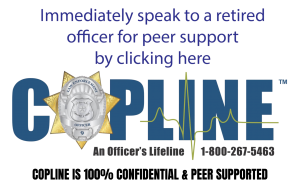Being a police officer is tough. Police officers are first on the scene of some of the most dangerous and demanding situations imaginable. With any given call comes the possibility of encountering a disturbing situation that the average civilian will likely never have to experience. But incidences involving violence, suicide, homicide, child abuse, and death are a regular part of police work. On average, police officers witness 188 ‘critical incidents’ during their careers. Over time, this constant exposure to trauma, along with the physical strain of working long hours, and constant scrutiny by an often-distrusting general public, takes a toll.
Statistics continue to paint a grim picture of the current state of those who have sworn to protect and serve their community. According to recent law enforcement statistics by the National Alliance on Mental Illness (NAMI), police officers report far higher rates of depression, PTSD, and anxiety than the general population. The suicide rate for law enforcement officers is multiple times higher than the rate of the general population, and three times as many officers kill themselves – about 300 annually – as are killed in the line of duty. This makes police officer suicide the single most lethal factor in police work.
Like most people, police officers take their own lives as a maladaptive response to personal and/or work-related situations they feel they cannot resolve. However, unlike many other, police tend to be personally invested in their professional role as law enforcement officers, and therefore react strongly when this image is threatened. In many cases of police officer suicide, there has been a cumulative effect of multiple stressors, often involving a combination of personal and work issues – the two pillars of self-esteem that most police officers rely on.
Risk Factors
A major element of officer suicide prevention involves identifying and addressing risk factors. Studies have shown that there appear to be some demographic and clinical characteristics that place certain individuals at greater risk than others. Generally, Caucasian males of older age are at increased risk for suicide, mostly because they are statistically at an increased risk for depression.
Studies show that the following descriptors are high risk indicators for suicide ideation:
- A personal history of previous suicide attempts
- A family history of suicide
- A subject who is currently depressed, psychotic, abusing substances, or who has a history of these syndromes
- Recent significant changes in mood
- Subjects who live alone or are otherwise isolated from interpersonal resources
- Individuals who have experienced a recent loss, either personal or job-related
- Those who are struggling with a current medical crisis
Some of the specific risk factors for police officer suicide will overlap with general risk indicators, while others are more unique to police work. Police officers who are under criminal or administrative investigation – especially if this represents the culmination of an otherwise shameful event in the officer’s career – often fear the loss of status and identity as a police officer. For some officers, it may be too much to bear.
Police officers can also become despondent when they feel they have let their fellow officers down in a crisis, froze during a critical incident, or failed in some way on an assignment. This shame is exponentially magnified if the lapse in performance resulted in the injury or death of another officer or innocent civilian.
For both police officers and the general population, current intent and/or plan are the two red flags that clinicians will use to determine whether an individual is an immediate suicide risk.
Warning Signs
Aside from recognizing general risk factors, family members, friends, and fellow officers can all be valuable resources in identifying officers in distress who may be at a more immediate risk for suicide. You do not need to be a clinical psychologist to be able to identify the multiple critical warning signs that indicate a police officer may be having suicidal ideations. Signs may be verbal or behavioral and are often mixed. While not all suicidal officers will display all these signs, even a few such cues should raise significant concern.
Some of the warning signs include the following:
- Self-isolating from friends and family
- Exhibiting a sudden and unexplained improvement in mood after being depressed or withdrawn
- This is a particularly dangerous sign because the officer has come to terms with death and is relieved that the end is near.
- Neglecting appearance and hygiene
- Openly discussing that he or she is out of control
- Expressing that he/she is overwhelmed and unable to find solutions to problems
- Developing a morbid interest in homicide or suicide
- Behavioral changes that include appearing hostile, argumentative, and insubordinate OR appearing passive, defeated and hopeless
- Inappropriately using or displaying his/her weapon unnecessarily
- Exhibiting reckless behavior by taking unnecessary risks on the job and/or in their personal lives
- Deteriorating job performance
- Developing problems with alcohol and/or drugs
- Asking another officer to keep his/her weapon
- Expressing the belief that life is meaningless or hopeless
- Giving away cherished possessions
So why don’t police officers simply turn to their departments for help? Unfortunately, there are several reasons. The stigmatization of mental health is a massive factor that prevents police officers in distress from seeking help. Officers not only do not want to be perceived as weak, but they also do not want to be placed on leave, reassigned to desk duty, have their weapon confiscated, become the center of disparaging talk from other officers, or be passed over for promotions in the future. All of these scenarios have occurred to many officers who have attempted to seek help from their departments. Unfortunately, the vast majority of depressed law enforcement officers take no action and remain at a high risk for suicide.
If you are a police officer in distress:
If you are a police officer who is struggling with depression or suicidal thoughts, confidential help is always available to you.
Bank The Blue and COPLine are 100% confidential resources available to all law enforcement officers.
COPLine is a 24/7 hotline that officers can call anytime – day or night – to speak with a vetted and trained retired police officer who understands the stressors of your job. All calls are strictly confidential.


